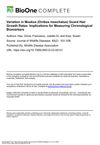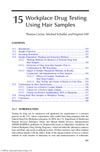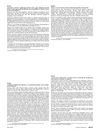 11 citations,
November 2015 in “Skin Research and Technology”
11 citations,
November 2015 in “Skin Research and Technology” Women's hair grows faster and thicker than men's, but hair growth slows for both genders with pattern hair loss.
 April 2024 in “Journal of wildlife diseases”
April 2024 in “Journal of wildlife diseases” Muskox hair growth rates vary widely, so a single growth rate can't be used for all populations.
 May 2023 in “General and comparative endocrinology”
May 2023 in “General and comparative endocrinology” Monkey hair cortisol levels are not affected by how fast their hair grows.
 July 2022 in “Research Square (Research Square)”
July 2022 in “Research Square (Research Square)” Hair analysis can somewhat track past testosterone levels but is influenced by factors like hair washing, growth rate, sex, and hair color.
 13 citations,
January 2020 in “Experimental Dermatology”
13 citations,
January 2020 in “Experimental Dermatology” PRP growth factor concentrations vary, no significant hair growth difference found.
 13 citations,
August 2016 in “Medical Hypotheses”
13 citations,
August 2016 in “Medical Hypotheses” Hair characteristics might be early signs of Type 2 Diabetes and could help with early prevention.
 September 2023 in “Scientific reports”
September 2023 in “Scientific reports” Segmental hair analysis can track testosterone over time but needs adjustments for sex, hair color, and washing frequency.
 January 2024 in “Dermatologic Therapy”
January 2024 in “Dermatologic Therapy” PRP therapy with specific growth factors improves hair density and thickness in androgenic alopecia.
 12 citations,
December 2017 in “Scientific reports”
12 citations,
December 2017 in “Scientific reports” The new test can measure very small amounts of testosterone in hair, and grinding the hair up first gives more accurate results.
 2 citations,
December 2021 in “Scientific reports”
2 citations,
December 2021 in “Scientific reports” Scalp hair sweating is a significant predictor of hair cortisol levels.
 1 citations,
August 2006 in “International forensic science and investigation series”
1 citations,
August 2006 in “International forensic science and investigation series” Hair testing is a reliable method for detecting workplace drug use when done with proper sample preparation and confirmation.

Forensic hair analysis for drugs is now more reliable and accurate.
 November 2022 in “Journal of Advances in Pharmacy Practices”
November 2022 in “Journal of Advances in Pharmacy Practices” The 5% terentang stem bark extract significantly increased hair growth in male rabbits.
 February 2013 in “Journal of the American Academy of Dermatology”
February 2013 in “Journal of the American Academy of Dermatology” Certain gene variations may increase the risk of alopecia, and platelet-rich plasma treatment can improve hair density in those with hair loss; a rare case of facial Becker's nevus was linked to uneven beard growth.
 72 citations,
February 2011 in “American Journal of Biological Anthropology”
72 citations,
February 2011 in “American Journal of Biological Anthropology” The conclusion is that recognizing hair growth cycles can improve the precision of dietary and health assessments from hair analysis.
 57 citations,
November 1987 in “Pediatric Dermatology”
57 citations,
November 1987 in “Pediatric Dermatology” Children's hair grows in different types from before birth through puberty, with growth rates and characteristics varying by age, sex, and race.
 5 citations,
October 2011 in “Small ruminant research”
5 citations,
October 2011 in “Small ruminant research” Goat hair growth and follicle activity change with the seasons and differ between males and females.
 February 2013 in “Journal of the American Academy of Dermatology”
February 2013 in “Journal of the American Academy of Dermatology” Certain gene variations might increase the risk of a hair loss condition in Koreans.
 July 2022 in “The journal of investigative dermatology/Journal of investigative dermatology”
July 2022 in “The journal of investigative dermatology/Journal of investigative dermatology” Hair growth cycles need varied signals in space and time.
 7 citations,
March 2012 in “Journal of Investigative Dermatology”
7 citations,
March 2012 in “Journal of Investigative Dermatology” Some thymic peptides can increase human hair growth, while others may inhibit it.
 January 2000 in “Optics Letters”
January 2000 in “Optics Letters” Laser treatment can inhibit hair growth and different hair colors reach different temperatures when lasered.
 26 citations,
March 1986 in “Clinical and Experimental Dermatology”
26 citations,
March 1986 in “Clinical and Experimental Dermatology” Scalp hair grows at 0.37 mm/day, forearm hair at 0.18 mm/day, and thigh hair at 0.30 mm/day, with no significant differences found in people with certain hair conditions.
6 citations,
January 1984 in “PubMed” Spironolactone treatment reduced hair growth and androgen levels in hirsute women, but the overall effectiveness was just adequate.
3 citations,
January 2020 in “Indian Journal of Dermatology” Certain gene variations in the Vitamin D Receptor are linked to higher risk of female hair loss.
 June 2022 in “Biomedical reports”
June 2022 in “Biomedical reports” STK11 gene variations do not predict how well metformin will work for PCOS, but may affect hair loss and excess hair growth.
34 citations,
October 2015 in “British journal of dermatology/British journal of dermatology, Supplement” Scientists don't fully understand eyelash hair follicle biology, including growth and color, and suggest more research is needed.
 2 citations,
March 2022 in “Research Square (Research Square)”
2 citations,
March 2022 in “Research Square (Research Square)” Seasonal changes affect gene activity linked to hair growth in Angora goats, influencing mohair quality.
Melatonin shortens the hair growth cycle by increasing PDGFA gene expression.
 36 citations,
November 2009 in “Journal of Investigative Dermatology”
36 citations,
November 2009 in “Journal of Investigative Dermatology” Prolactin may affect hair growth differently based on gender and scalp area.
 January 2001 in “Nishi Nihon hifuka”
January 2001 in “Nishi Nihon hifuka” The document concluded that there are differences in hair growth cycles and skin cell turnover rates, which can be measured with electronic equipment.


























